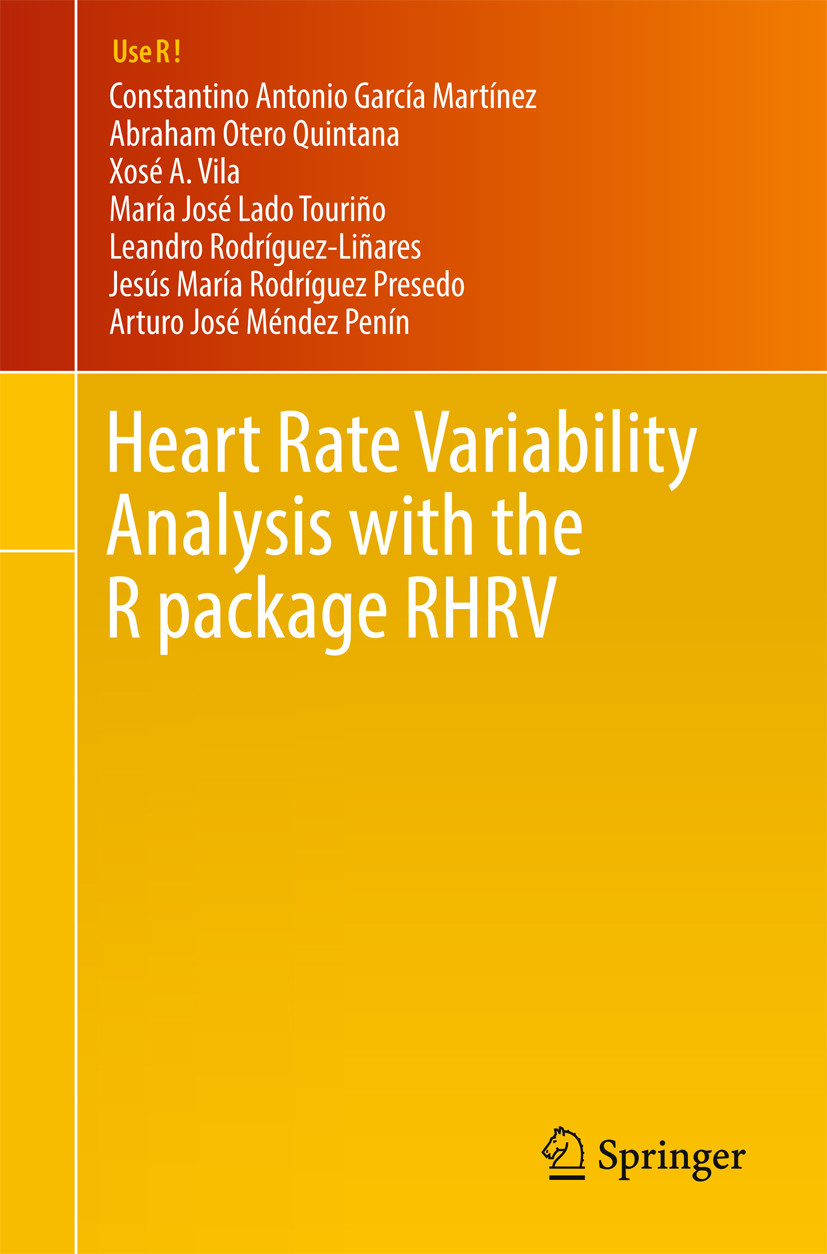Heart Rate Variability Analysis with the R package RHRV
| Auflage | 1. Auflage, 2017 |
| Verlag | Springer-Verlag |
| ISBN | 9783319653556 |
Produktbeschreibung
This book introduces readers to the basic concepts of Heart Rate Variability (HRV) and its most important analysis algorithms using a hands-on approach based on the open-source RHRV software. HRV refers to the variation over time of the intervals between consecutive heartbeats. Despite its apparent simplicity, HRV is one of the most important markers of the autonomic nervous system activity and it has been recognized as a useful predictor of several pathologies. The book discusses all the basic HRV topics, including the physiological contributions to HRV, clinical applications, HRV data acquisition, HRV data manipulation and HRV analysis using time-domain, frequency-domain, time-frequency, nonlinear and fractal techniques.
Detailed examples based on real data sets are provided throughout the book to illustrate the algorithms and discuss the physiological implications of the results. Offering a comprehensive guide to analyzing beat information with RHRV, the book is intended for masters and Ph.D. students in various disciplines such as biomedical engineering, human and veterinary medicine, biology, and pharmacy, as well as researchers conducting heart rate variability analyses on both human and animal data.
Constantino Antonio García Martínez is a Ph.D. student in Computer Science and Artificial Intelligence at the Centro Singular de Investigación en Tecnoloxías da Información (University of Santiago de Compostela). His main research interest is the application of stochastic models and dynamical systems theory to biosignals, especially in the field of electrocardiography and heart rate variability analysis.
Abraham Otero was born in Orense, Spain in 1978. He received a B.Sc. degree in Physics in 2000 (with honors), and Ph.D. degree in Computer Science from the University of Santiago de Compostela. In 2006 he moved to San Pablo CEU University, where he cofounded the Laboratory of Bioengineering and created the Biomedical Engineering degree course. Currently he is an associate professor and coordinator of the degree in Biomedical Engineering at the University CEU San Pablo, and visiting professor at the University of Turabo, Puerto Rico. He is coauthor of 24 scientific papers and 38 contributions at conferences and symposiums, most of then in the field of biosignal processing.
Xosé A. Vila received a B.Sc. and Ph. D. from the University of Santiago de Compostela with a thesis on HRV. He was an associate professor of Computer Science there, and has been an associate professor of Computer Science at Vigo University, in Spain since 2006. He is coauthor of more than 20 scientific papers and more than 30 contributions at conferences and symposiums on HRV, and he has led and participated in various research projects related with HRV. Since 2011 he has been the head of the Center for Research, Transfer and Innovation at Vigo University.
María José Lado Touriño was born in 1971 in Santiago de Compostela (Spain). She received B.Sc. and Ph.D. degrees in Physics from the University of Santiago de Compostela, in 1995 and 1999, respectively. She is presently associate professor of Computer Science at the University of Vigo, Ourense, Spain. Her research interests include computer-aided diagnosis systems in medical imaging and biomedical signal processing. She is author of more than 30 papers in scientific journals, and more than 50 contributions at conferences and symposiums on biomedical signal processing.
Leandro Rodríguez-Liñares was born in 1967 in Santiago de Compostela (Spain). He received a B.Sc. in Pharmacy from the University of Santiago de Compostela in 1990 and a B.Sc. in Telecommunications Engineering from the University of Vigo in 1994. He also obtained his Ph.D. in Telecommunications Engineering from the same university in 1999, and is currently associate professor of Computer Science there. He is author of more than 20 papers in scientific journals, and more than 30 contributions at conferences and symposiums on natural language interfaces and biomedical signal processing.
Jesús María Rodríguez Presedo received B.Sc, and P
h.D. degrees in Physics from the University of Santiago de Compostela, Santiago de Compostela, Spain, in 1989 and 1994, respectively. He is currently a researcher at the Centro Singular de Investigación en Tecnoloxías da Información, University of Santiago de Compostela. His research interests include biomedical digital signal processing, heart rate variability, nonlinear dynamics, soft computing and the development of ubiquitous healthcare systems.Arturo José Méndez Penín was born in 1969 in Ourense (Spain). He received a B.Sc. from the University of La Laguna in Physics, and a Ph.D. from the University of Santiago of Compostela. He is an associate professor at the Department of Computer Science of the University of Vigo. His research interests include biomedical signal processing, mainly in ECG and HRV, and computer aided diagnosis. He is coauthor of more than 25 scientific papers and more than 60 contributions at conferences and symposiums.
